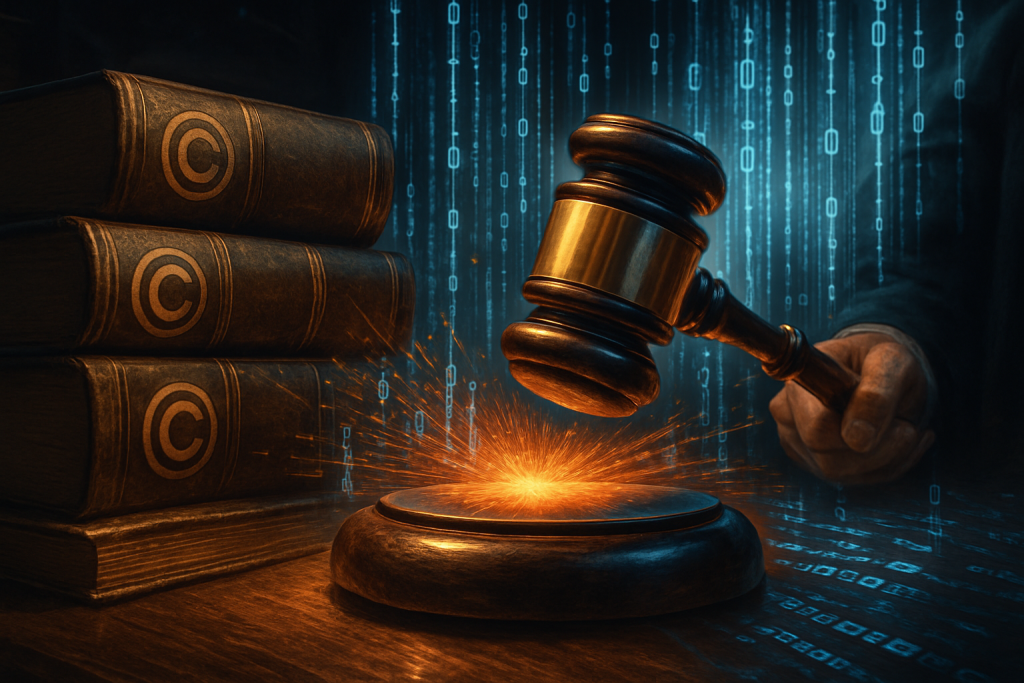The year is 2025. Flying cars are still, sadly, a pipe dream, but AI is everywhere. Your fridge orders groceries based on your fluctuating cholesterol levels, your self-folding laundry unit judges your fashion choices (harshly, we hear), and chatbots can write sonnets that would make Shakespeare weep (with envy, hopefully). But behind the AI curtain, a storm has been brewing, a legal tempest over the very lifeblood of these digital brains: data. And yesterday, that storm broke in spectacular fashion.
Anthropic, the AI powerhouse behind the increasingly popular Claude chatbot, just agreed to a staggering $1.5 billion settlement in a class-action lawsuit brought by a coalition of authors. Remember that old adage, “garbage in, garbage out?” Well, in the AI world, it’s more like “books in, brilliance out” – or at least, that’s the idea. The lawsuit alleged that Anthropic, in its relentless quest to build the best language model, had essentially vacuumed up millions of copyrighted books to feed its AI, all without so much as a “by your leave” to the authors who poured their blood, sweat, and tears (and okay, maybe a little wine) into crafting those literary worlds.
Think of it like this: Imagine you’re a chef, and you’ve spent years perfecting your grandmother’s secret lasagna recipe. It’s your masterpiece. Then, a tech company comes along, sneaks into your kitchen in the dead of night, copies your recipe, and starts selling lasagna all over town, without giving you a dime or even acknowledging your contribution. That’s essentially what the authors were claiming, only instead of lasagna, it was their intellectual property fueling the AI revolution.
But how did we get here? Let’s rewind a bit. The rise of large language models (LLMs) has been nothing short of meteoric. These AI systems, capable of generating text, translating languages, and even writing code, are trained on massive datasets, often scraped from the internet. And while much of that data is in the public domain, a significant portion is copyrighted material. The problem? Figuring out where the fair use line is drawn in the digital sand.
Is it fair use to train an AI on copyrighted books if the AI isn’t directly reproducing those books verbatim? Or is it a violation of copyright, regardless of the output? This is the million-dollar, or rather, the $1.5 billion question. And it’s a question that’s been plaguing the AI industry for years.
The Anthropic settlement doesn’t explicitly answer that question, but it does send a deafening message: AI companies can’t afford to ignore copyright laws. It’s a shot across the bow, a warning that the Wild West days of unchecked data scraping are coming to an end. This is not the Matrix, you can’t just upload information into your brain without consequences.
The Technical Nitty-Gritty (Simplified)
So, how exactly does an AI “learn” from books? It’s not like they’re sitting down with a cup of tea and annotating Shakespeare. Instead, LLMs analyze the statistical relationships between words and phrases in the text. They identify patterns, learn grammar, and develop a sense of context. The more data they’re fed, the better they become at generating human-like text. It’s like teaching a parrot to talk, only instead of mimicking individual words, it’s mimicking the entire structure of language.
The problem, of course, is that the “parrot” is learning from copyrighted material. And while the AI’s output may not be a direct copy of any particular book, it’s still influenced by the style, vocabulary, and ideas contained within those books. This raises complex questions about attribution, ownership, and the very nature of creativity in the age of AI.
Who’s Feeling the Heat?
The immediate impact is, of course, on Anthropic. $1.5 billion is a hefty sum, even for a well-funded AI startup. But the ripple effects will be felt throughout the entire AI industry. Every company that relies on large datasets for training their models is now taking a long, hard look at their data sourcing practices. Are they using copyrighted material without permission? Are they vulnerable to similar lawsuits?
Authors, publishers, and other content creators are breathing a collective sigh of relief. They see the settlement as a victory for intellectual property rights and a step toward a more equitable AI ecosystem. However, the battle is far from over. This is just one skirmish in a much larger war over the future of copyright in the age of AI.
The Political and Societal Chessboard
This lawsuit also throws fuel on the fire of the ongoing debate about AI regulation. Governments around the world are grappling with how to regulate this rapidly evolving technology. Should there be stricter rules on data collection? Should AI companies be required to obtain licenses for using copyrighted material? Should there be a dedicated agency to oversee AI development?
These are all thorny questions with no easy answers. On one hand, we want to foster innovation and encourage the development of beneficial AI technologies. On the other hand, we need to protect intellectual property rights and ensure that AI is developed in a responsible and ethical manner. It’s a delicate balancing act, and the Anthropic settlement has only made it more complex.
The Ethical Quagmire
Beyond the legal and financial implications, the Anthropic case raises profound ethical questions about the role of AI in society. Are we creating a world where machines can learn and create without acknowledging the contributions of human artists and thinkers? Are we devaluing creativity and incentivizing the exploitation of intellectual property?
These are not just abstract philosophical questions. They have real-world consequences. If authors and artists are not fairly compensated for their work, they may be less likely to create in the future. And if AI companies are allowed to freely use copyrighted material without permission, they may gain an unfair advantage over smaller creators and innovators. It’s a slippery slope that could lead to a less vibrant and diverse cultural landscape.
The Financial Fallout
The $1.5 billion settlement is not just a one-time expense. It’s a sign of things to come. AI companies can expect to face increasing legal scrutiny and higher costs associated with data sourcing. This could lead to a slowdown in AI development and a shift in investment priorities.
Companies that are willing to invest in ethical data practices and transparent licensing agreements may gain a competitive advantage in the long run. But those that continue to rely on questionable data sourcing methods could face significant legal and financial risks. It’s a classic case of “pay now or pay later,” and the Anthropic settlement has made it clear that the “later” option could be far more expensive.
In the end, the Anthropic settlement is a wake-up call for the AI industry. It’s a reminder that innovation must be balanced with respect for intellectual property rights and ethical considerations. The future of AI depends on our ability to navigate these complex challenges and create a framework that benefits both creators and consumers. So, next time you’re chatting with Claude, remember the authors who helped teach it to talk. They deserve a little credit, and maybe even a little compensation.
Discover more from Just Buzz
Subscribe to get the latest posts sent to your email.


